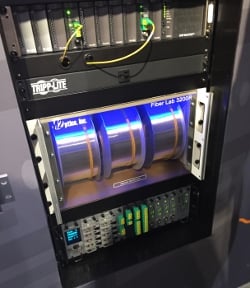 Fiber optic networks are essential to the functioning of blockchain technology. In short, blockchain is a decentralized system that relies on a distributed network of computers to maintain a digital ledger of all transactions. Allowing for secure, transparent, and immutable record-keeping, this technology has a wide range of applications in finance (cryptocurrency for example), supply chain management, and other industries. Offering high-speed, low-latency data transmission capabilities, fiber optic networks are the ideal choice for supporting the complex and data-intensive operations of blockchain technology.
Fiber optic networks are essential to the functioning of blockchain technology. In short, blockchain is a decentralized system that relies on a distributed network of computers to maintain a digital ledger of all transactions. Allowing for secure, transparent, and immutable record-keeping, this technology has a wide range of applications in finance (cryptocurrency for example), supply chain management, and other industries. Offering high-speed, low-latency data transmission capabilities, fiber optic networks are the ideal choice for supporting the complex and data-intensive operations of blockchain technology.
One of the main benefits of utilizing fiber optic networks for blockchain technology is their ability to support high-volume data transfer at high speeds. Blockchain applications require a large amount of data to be transferred between nodes in and across the network to validate transactions and maintain the integrity of the ledger. Without a fiber optic infrastructure capable of supporting these data and resource-intensive processes, bottlenecks and slowdowns would be more commonplace, increasing the likelihood of unacceptable performance or failures. By providing the high bandwidth and low latency necessary for quick and reliable data transfer, fiber optic networks ensure greater levels of efficiency and performance of the blockchain network.
In addition to supporting the transfer of large amounts of data at lower latency, fiber optic networks provide enhanced reliability and security for blockchain networks. Unlike traditional copper cables, optical fiber is not affected by electromagnetic interference (EMI) or radio frequency interference (RFI), while being more resilient against temperature and environmental changes. Fiber is also more difficult to access and tap into from a security standpoint, reducing some of the risks of malicious data theft. Lastly, since blockchain technology relies on a decentralized architecture of distributed nodes interconnected through a series of communication channels, using optical fiber supports the transmission of data over more secure, encrypted channels, mitigating the risk of cyber-attacks and data breaches.
Finally, due to the continued advancement of fiber optic communications technology, fiber-based networks are highly scalable, which is essential for supporting the rapid growth of blockchain. As the number of nodes in the blockchain network increases along with the volume of data, the network must be able to scale to meet the demand. Fiber optic networks can support high bandwidth and low latency requirements required for rapid and reliable data transfer while expanding and evolving to meet the needs of the users.
With all of this in mind, it is clear that fiber optic networks play a critical and important role in the effective functioning of blockchain technology. The high-speed, low-latency advantages offered by optical fiber and the added reliability, security, and scalability position fiber optic networks as the ideal choice for supporting sophisticated blockchain technology needs. As the use of blockchain-based applications continues to grow and evolve, the importance of fiber optic networks will only become more pronounced.
Partner with M2 Optics to Simulate Your Blockchain Fiber Optic Network
M2 Optics is the leading, globally-recognized manufacturer of customized fiber network simulator solutions that enable communications engineers to accurately replicate optical characteristics and latency in the most efficient manner. To ensure your blockchain network, devices, and applications will perform as intended, simulating the fiber network architecture in the testing environment is both essential and a best practice.
Fiber Lab platforms, which are 100% customized to each user's specification and offer virtually all fiber types, lengths (by distance or latency value), and setup configurations, provide the ability to exactly simulate/replicate field network performance. Contact M2 Optics to design yours today.





